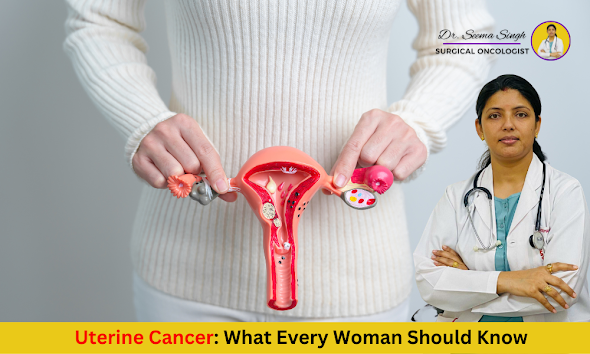Uterine Cancer: What Every Woman Should Know
Uterine cancer, also known as endometrial cancer, is a type of cancer that affects the uterus, which is a part of the female reproductive system. The uterus is where a fetus develops during pregnancy. Uterine cancer can develop in two main areas of the uterus:
Endometrial cancer: This type of cancer starts in the endometrium, which is the inner lining of the uterus. It is the most common type of uterine cancer, accounting for about 95% of cases.
Uterine sarcoma: Uterine sarcoma develops in the myometrium, which is the muscle wall of the uterus. It is a very rare type of uterine cancer.
People often use the terms "endometrial cancer" and "uterine cancer" interchangeably, as endometrial cancer is the most common form of uterine cancer. Uterine cancer can be a serious condition, but with early detection and treatment, the prognosis is often good.
The uterus is a vital organ in the female reproductive system. It is located in the pelvis and is responsible for nurturing and protecting a developing fetus during pregnancy. The top part of the uterus is called the body or corpus, and the lower part is called the cervix, which connects the uterus to the vagina. Uterine cancer specifically refers to cancer in the body of the uterus, not in the cervix. Cervical cancer is a different type of cancer that affects the cervix.
The endometrium is the inner layer of the uterus that undergoes changes during the menstrual cycle. Hormones called estrogen and progesterone cause the endometrium to thicken in preparation for a possible pregnancy. If pregnancy does not occur, the body reduces the production of progesterone, leading to the shedding of the endometrial lining, which results in menstruation.
Uterine cancer is relatively common, especially among women who have gone through menopause. In the United States, endometrial cancer is the most common cancer affecting the reproductive system of women. About 3% of women will receive a diagnosis of uterine cancer at some point during their lives, and each year, about 65,000 people are diagnosed with the disease.
The exact cause of uterine cancer is not known, but several risk factors can increase the likelihood of developing the disease. These risk factors include age (most cases occur after age 50), obesity, a diet high in animal fat, a family history of certain genetic disorders (such as Lynch syndrome), diabetes, and certain ovarian diseases.
Symptoms of uterine cancer can include vaginal bleeding between periods, vaginal bleeding or spotting after menopause, lower abdominal pain or cramping, thin white or clear vaginal discharge in postmenopausal women, and extremely prolonged, heavy, or frequent vaginal bleeding in women older than 40. If you experience any of these symptoms, it is essential to consult a healthcare provider for proper evaluation and treatment.
there are Top Uterine Cancer Specialist Delhi who can provide expert care and treatment for uterine cancer. These specialists have the knowledge and experience to diagnose and treat uterine cancer using the latest medical advancements and techniques. If you are at risk for uterine cancer or experiencing symptoms, it is important to consult with a specialist for proper evaluation and management.
In South Delhi, you can find some of the best uterine cancer doctors who specialize in diagnosing and treating uterine cancer. These specialists have extensive experience in dealing with various types of uterine cancer and can provide personalized treatment plans based on your individual needs. If you are looking for the best uterine cancer doctor in South Delhi, it is advisable to research and consult with multiple specialists to find the one that is right for you.
.png)
.png)
.png)

Comments
Post a Comment